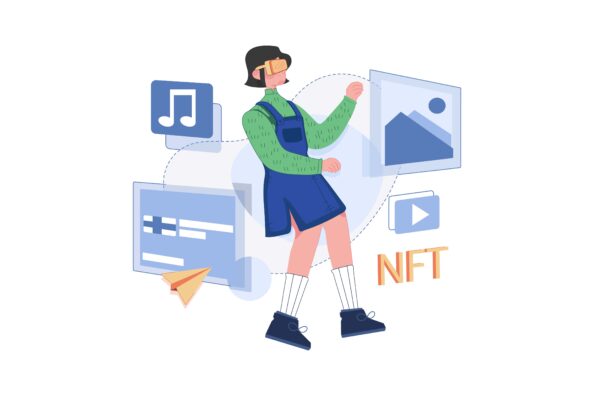
What is Music for us? It is literally everywhere: we wake up to the sound of an alarm clock, make coffee to the sound of a kettle, and go to work to the sound of our favorite songs. So there is music in everything if you have an ear for it.
As for the music industry, it has changed a lot in the last few decades. For example, physical record sales have plummeted. Now we are in the era of streaming services which pay very little even for stars with millions of fans. That’s why artists claim they can’t make a living from music anymore.
Music NFTs promise to change that by offering a new way for creators to get paid for their work. They are likely to increase artists’ wealth, create greater fan engagement, and change the industry for the better.
In this article, we will try to understand how we, as creators and fans, can use music NFTs.
Music NFTs are a distinct type of non-fungible tokens (NFTs) on the blockchain. A certain amount of tokenized audio files represent music NFTs. These NFTs serve as digital certificates that are embedded in a blockchain network. Music NFTs can contain both musical and visual components, as typical NFTs only have visual assets. This type of NFT can be sold in editions of any size, with a limited supply to ensure they sell out.
Most music NFTs can be described as extremely rare digital collectibles. They carry no licensing and publishing capabilities, no masters, and no royalty rights. Music NFTs reproduce a limited edition of an album or single that is displayed on-chain using Web3 technologies. Currently, the majority of these NFTs don’t include any ownership rights, but this may change in the future.

In the Web2 era, creators had to rely on record labels, streaming services, and touring to make money. They also had to deal with numerous intermediaries who took a significant share of the musicians’ royalties.
With non-fungible tokens, artists can cut out third parties like distributors, record labels, and streaming platforms and sell their music NFTs directly to fans. Furthermore, the low barrier to entry into the Web3 music industry allows any creator to release music and earn money as an unsigned musician.
Compared to the price of a Spotify stream, which is $0.003 – $0.005 per stream, the price of most NFTs is much higher, so musicians do not need millions of streams to make a respectable income. Therefore, they do not need to commercialize or sell their music because it all depends on a small community supporting their art.
Smart contracts behind music NFTs protect musicians from being cheated out of their money. With smart contracts, artists can track who holds their music NFTs, monitor secondary market sales, and receive a portion of the royalties each time the NFT is resold.
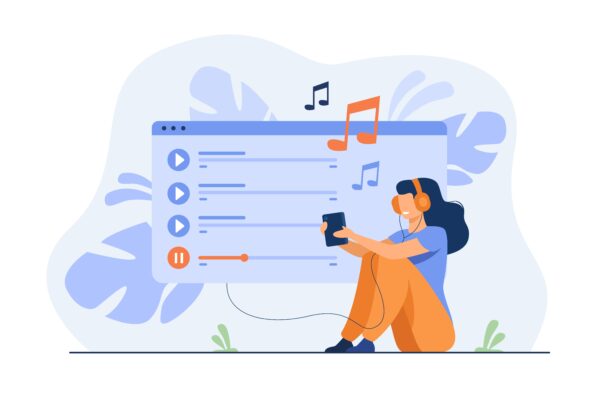
Today, the music industry is facing more challenges than ever before. For example, physical record sales have dropped dramatically, giving way to the rise of online streaming services. These services may seem like an easy way for musicians to reach a wider audience and earn more money.
However, online streaming services provide paltry payments to musicians, even those with millions of fans worldwide. Many musicians resent the lack of opportunity to profit from their work. In such cases, music NFTs can offer viable solutions to rethink the industry’s traditional revenue and ownership models. In addition, many examples of music NFTs have proven their effectiveness in increasing fan participation while cutting out record labels and other middlemen.
Let’s take a look at how music NFTs work. First, an artist decides what type of content they want to make available to their audience and creates it. It could be concert tickets, audio files, or special merchandise. Next, they need to choose a blockchain network to build NFTs on and a music NFT marketplace to launch tokens.
After selecting the desired NFT marketplace or platform, artists can inform their audience about upcoming NFT drops. Musicians can then put their NFTs up for auction according to their desired price.
Why do creators rely on NFTs? Non-fungible tokens cannot be duplicated. Musicians and producers can choose different ways to distribute NFTs to their fan base. The most common way to distribute music NFTs is through a one-time sale where the highest bidder can purchase the tokenized audio file.
In the case of a one-time sale, the user receives ownership of the audio rather than the copyright. In contrast, musicians can choose to distribute their best music NFTs via small copies of the same file. This allows creators to sell small copies on a marketplace while retaining the copyright to the audio file. Now you can see how using NFTs in the music industry eliminates the need for middlemen between artists and their fans.
Fans who purchase music NFTs can own a unique work of art created by their favorite artist. What’s more, fans can store their tokens in crypto wallets and resell them to the highest bidder. As for the musicians, they can receive royalties for the use of the NFT every time it is resold.
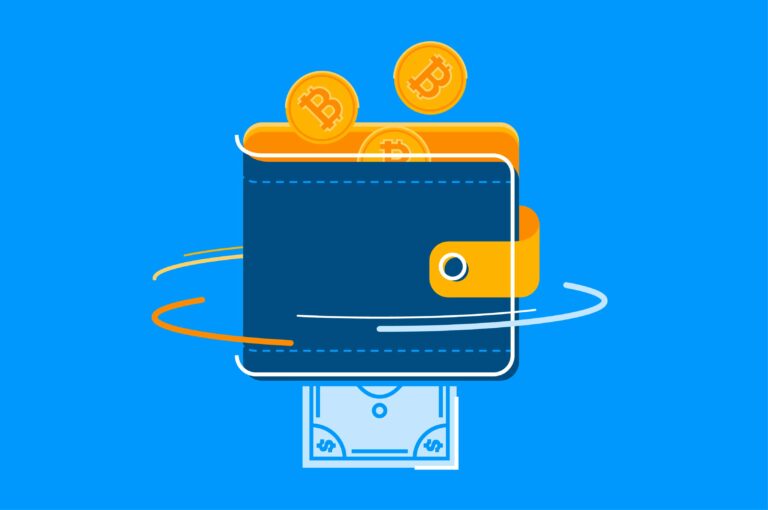
As more and more people are turning to NFTs, different ways of using NFTs in the music industry are coming out. Even though NFTs are quite new to this industry, there are several types of music NFTs. Let’s get to know them.
Autograph NFTs
With the advent of non-fungible tokens in the music industry, music fans can now own autographs of their favorite artists, bands, or musicians in the form of NFTs. Every fan knows that autographs from their idols are priceless. Therefore, owning such NFTs increases their value and can be kept forever or sold for higher prices.
Music-related digital artwork
Artwork is an essential part of the music industry. Digital works of art in music include album covers, concert photos, and posters. All of these types of artwork can be turned into NFTs and sold at high prices.
NFTs of music albums and songs
Music NFTs make it possible for fans to own their idol’s music. Many artists and musicians have started to release their albums and singles in the form of NFTs.
Ticket NFTs
Ticket NFTs improve the quality of life for both musicians and their fans. Distributing ticket NFTs to music lovers greatly reduces ticket fraud. Paper tickets have no value after the concert, while ticket NFTs have long-term value. These non-fungible tokens can be resold at a regular price.
Video NFTs
Concert and song videos can be converted into non-fungible tokens and then sold at regular prices. Fans who own such NFTs can capture moments and resell them at desired prices.
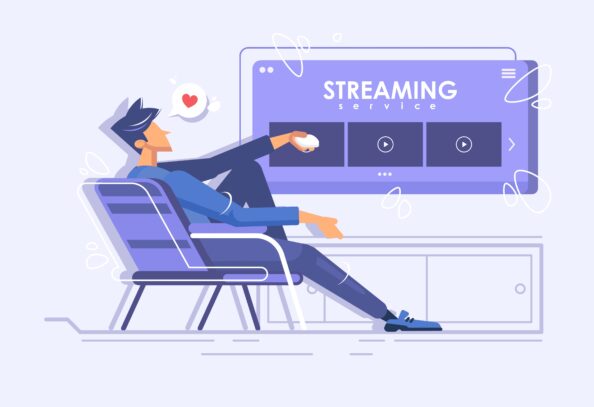
The era of streaming platforms has given fans easy access to virtually any song, making it something of a golden age for fans. However, musicians don’t benefit as much as their fans. Currently, business models in the music industry seem to reward only the big labels and platforms, while bypassing the creators who are the lifeblood of the industry.
As mentioned above, creators need millions of streams to earn a respectable income. According to Spotify, only 7,500 creators earned $100,000 or more per year on the platform, including more than 1,000 musicians who earned more than $1 million on Spotify. Thus, streaming offers great benefits to the consumer and the provider while offering almost nothing to the artist.
Non-fungible tokens have created a new economic model, providing new ways to make money from intellectual property without the need for third-party involvement. In addition, NFTs allow musicians to earn royalties from secondary sales through mechanisms built into blockchain. These features help artists take ownership of their work and eliminate the risks associated with musicians earning extremely low rates from centralized streaming platforms.
As mentioned above, the music industry’s business model rewards only major record labels and popular artists while bypassing independent musicians. However, NFTs are a great relief for creators, as they can receive substantial benefits. Let’s see what musicians get when they use NFTs.
Blockchain
Blockchains are digital ledgers stored on computers around the world, so records remain immutable once they are shared on the network. In theory, non-fungible tokens can exist forever (or at least as long as there is an internet connection anywhere in the world). In addition, the blockchain verifies transactions and allows users to safely buy, sell, and trade NFTs.
Direct connection
Music NFTs offer artists a unique opportunity to interact directly with their fans, cutting out middlemen. As a result, unsigned musicians can potentially earn 100% of the profits.
No debts
A record deal is like a loan, so the profits artists make from selling their albums have to pay back the initial “deal.” As a result, many artists find themselves in debt early in their careers. NFTs help musicians raise money without going into debt.
Proof of ownership
NFTs serve as digital certificates of ownership of an asset, allowing musicians to claim ownership of digital files.
Scalability
Artists can sell their music NFTs to Web3 users worldwide.
Secondary royalties
NFTs can be resold on secondary marketplaces, so their creators, bound by smart contracts, will receive royalties from secondary sales of their work. If an NFT song becomes popular and continues to sell, its creators will continue to make a profit.
All in all, NFT music is unlikely to replace either record labels or the streaming business model. However, it is likely to help emerging artists negotiate better deals in the future.
NFTs tend to remove barriers and change the entire business model of the music industry. It makes musicians more powerful by allowing them to get rid of central authorities that take away their creative and financial success.
In this regard, music NFTs help not only by giving our favorite creators back their power but also by allowing the music industry to choose a fairer model for its long-term prosperity.
The benefits of music NFTs for musicians are more than just building a unique audience. Let’s take a closer look at them.
An independent ecosystem
Blockchain technology helps record data, making it easier than ever to keep track of. This feature allows musicians to stay focused on their creativity and grow individually. Distributed ledgers that store information encourage music companies to shift their focus from large corporations to creators and adapt their business models accordingly.
Content control
Integrating NFTs with music gives music artists and creators complete control, allowing them to keep up with updates related to any given NFT. For example, they can be notified when an NFT changes hands, regardless of who owned it before and who owns it now. Therefore, the chances of copyright infringement are low. This happens thanks to the consumer-to-consumer distribution of content.
Royalty payments
Original creators are typically at a disadvantage when it comes to receiving royalties. Traditionally, the profits generated by a particular song were split between the artist, the producers, and the publisher. As a result, musicians often didn’t receive their fair share. Thanks to music NFTs, a fair distribution of royalties is possible.
Security
Smart contracts are digital contracts and a breakthrough in blockchain technology that allows for the automation of agreements. In the music industry, smart contracts help direct how payments are distributed to the right holders. Smart contracts eliminate the need for third-party involvement, making the entire automated system more cost-effective and faster.
In other words, when artists have digitized copies of their music with NFTs, they can sell their songs and interact directly with fans.
Transparency
NFTs are backed by blockchain, by far the most secure and transparent technology available. Blockchain-powered NFTs enable the seamless association of an original music file with its various owners. Furthermore, the tracking of consumption and usage of content produced on different platforms has become more efficient.
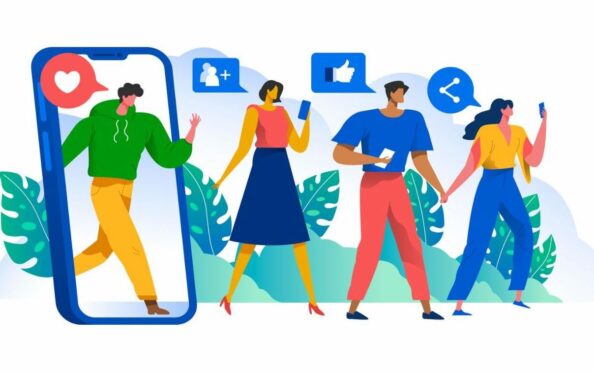
What is the difference between an audience and a community? An audience is usually explained as a one-way relationship, while a community is a two-way communication between the creator and the fans. The people who make up a community should improve the creative process, listen to each other’s needs, and suggest solutions that will make the whole community better. In this way, the community will be productive.
As musicians turn to a more community-driven approach, blockchain and NFTs allow creators to raise money from their fans without intermediaries and provide exclusive benefits and opportunities to those who contribute. Existing platforms are still an essential tool for building communities and distributing music to extend a Web3 strategy.
According to Mattias Tengblas, CEO and co-founder of Corite, a blockchain-based crowdfunding music platform, cheap digital recording has caused an explosion of artists on YouTube interacting with their community to collaborate, get instant feedback, stream, etc. In addition, social media and messengers like Discord, Instagram, Telegram, TikTok, and Twitter allow people who are passionate about what you’re doing to engage with more of your content and communicate with you and each other.
When a musician posts a new video to YouTube, their community can provide instant feedback and suggest new ideas to help the creator grow and develop. In this way, the community can contribute to the musician’s work.
Communities carry out activities that tend to have a greater impact and immediately affect a musician’s growth. Supported by strong communities, musicians have a solid foundation on which to build a career.
According to Takayuki Suzuki, CEO of MetaTokyo, a Web3 entertainment studio, the engagement process between the musician and their community should become as easy as possible. As Web3 gives more power to creators, there will be a demand for education. Supporters and contributors in a community who don’t grab information and money can become middlemen.
Clear communication and making NFTs more accessible to everyone are the first steps. Bringing NFTs and the content ownership model closer to the fans will definitely boost creator communities by providing a much stronger and more exclusive connection between fans and musicians.
According to Marcus Feistl, COO of Limewire, a music NFT marketplace, this means that creators will have an easy-to-use self-boarding process where they can create their first NFT project in a few clicks. For fans, there will be two options: the first is to use a fully custodial service without the need to own a wallet, and the second is to connect directly to an external wallet and get the full Web3 experience.
The creators most likely to succeed in today’s industry are those who are willing to use every tool available to build an interactive and engaged community around their work.
Audius

Audius is a music streaming and sharing platform and NFT marketplace. It aims to use blockchain technology to decentralize the music industry. Audius runs a streaming service where musicians can sell NFTs via its native $AUDIO token to make money from their work.
Musicians can use the platform to engage with their fans, allow songwriters to share additional content, run remix contests, monetize their songs, offer unique bonuses to collectors, and share original works. In addition, users can link their music NFTs on the Ethereum and Solana blockchains to their Audius profiles. Deadmau5 and Rezz are among the famous musicians collaborating with the platform.
Mintable

Mintable is an easy-to-use NFT marketplace that allows creators to mint their digital works on the blockchain for free. The platform offers a wide variety of assets to trade, including a large selection of music tracks. Mintable provides its passionate community with different types of auctions.
OpenSea

OpenSea is one of the most popular and largest NFT marketplaces. It allows users to create and sell almost any type of NFT you can imagine, including digital artwork, collectibles, domain names, and music. The marketplace includes a special section for NFT music.
OpenSea has a minting tool that lets users create and sell music NFTs. It also allows artists to customize their NFTs so they can earn royalties on secondary market sales.
OpenSea supports independent artists and musicians. Imogen Heap, Snoop Dogg, and The Weeknd are some of the celebrities who have launched NFT collections on the platform.
Rarible

Rarible is one of the first NFT marketplaces to allow the trading of music NFTs. It also supports books, digital art, movies, and other types of NFTs. The platform is community-owned and community-operated. Those users who own the RARI digital token run Rarible’s decentralized framework. RARI tokens can be used to mint NFTs on the platform.
Rarible charges 2.5% on all sales made on the platform and offers up to 10% in royalties. This policy makes Rarible one of the best NFT marketplaces for musicians. Users can purchase NFT music with debit or credit cards, cryptocurrencies, and stablecoins.
Royal

Royal is a music NFT marketplace founded by Justin Blau (3LAU) and Justin Ross, co-founder of Opendoor. The marketplace gives NFT owners the rights to the songs sold on it. The creators are the lifeblood of the platform, and they decide how much royalties they want to receive for their work.
Many musicians consider Royal to be the best marketplace for music NFTs because they can choose the size of their royalty payments. In addition, artists can offer additional perks on music NFTs, including digital art, fan experiences, bonus tracks, and more. The platform also allows musicians to share control of their soundtracks with NFT holders and collectors. In other words, if you’re a collector on the Royal platform, you get a percentage of the secondary sales.
Royal is an invite-only marketplace. Diplo, Nas, and The Chainsmokers have launched their NFT collections on the platform. Users can pay for music NFTs on Royal with cryptocurrency or debit/credit cards.
Sound.xyz

Sound.xyz is a music NFT marketplace where users can buy and sell tokenized music. The platform also doubles as a streaming service. Sound.xyz allows fans to directly support their favorite musicians, while artists can host a launch event for new singles when they’re released. Musicians can release their songs and albums as non-fungible tokens, each with a unique number, so that fans can buy these tokens early.
Such listening events can also be beneficial to fans, as early editions of songs and albums tend to have a higher value than future versions. The Sound.xyz platform enables fans to post comments about the music they want to support. The platform also offers artist-owned contracts, allowing musicians to retain ownership and chain of custody of their work.
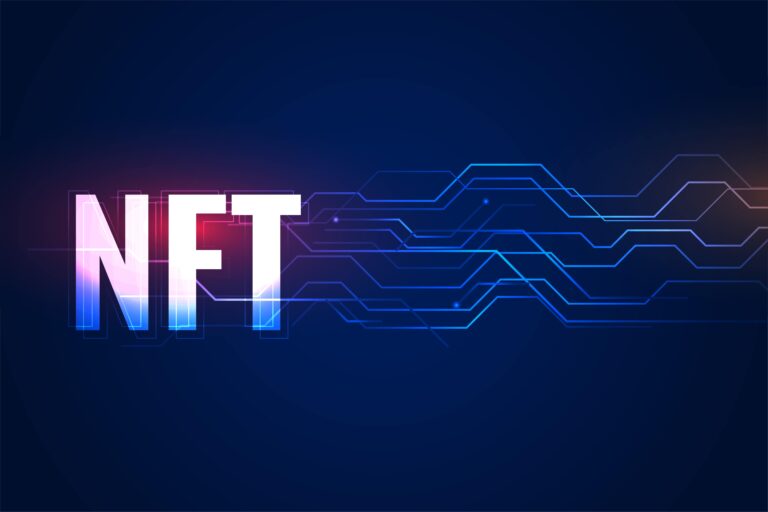
Let’s take a look at some of the most prominent musicians already using NFTs.
deadmau5
Techno artist deadmau5 is already well known in the crypto world for his collaboration with the Sandbox metaverse. He sells 3D artwork, tickets to exclusive music events, and songs directly through the Nifty Gateway platform.
Justin Blau, 3LAU
3LAU is an American DJ and one of the pioneers in the use of NFTs. Justin sold his first NFT in 2020, long before non-fungible tokens became trendy. In 2021, he sold 33 NFTs to celebrate the third anniversary of his album Ultraviolet. The sale proved successful, and the DJ earned approximately $12 million.
3LAU has focused on the world of NFT music and launched Royal, a decentralized music platform. Music NFTs sold on the platform are associated with both a song and a percentage of royalties determined by the artist. Therefore, whoever owns the NFT associated with a song will benefit every time it is purchased or used in commercials or movies. This concept allows fans to own a piece of their favorite songs on the blockchain.
Kings of Leon
The US rock band Kings of Leon released their album While You See Yourself on the NFT platform YellowHeart. There were three types of NFTs: the first provided free access to all of the band’s concerts, the second included the album with bonus tracks, and the third was a collection of artworks on the blockchain associated with the album. Each NFT is linked to a different piece of art. The rarest tokens with the most detailed designs cost $2,500.
Ringo Starr
The Beatles drummer has partnered with auction house Julien’s Auction to launch a collection of 20 NFTs called ‘The Creative Mind of a Beatle’. The collection includes five animated paintings accompanied by Ringo Starr’s drum solo. Each painting is available in 4 unique copies granted by the blockchain. In addition, NFT buyers get a physical painting signed by Ringo and can also ask him for a virtual meeting on the Spatial.io platform.
Whitney Houston
The stepsister of the legendary soul singer has sold an unreleased demo that Whitney had recorded when she was 17. The song is accompanied by a video by digital artist Diane Sunclair. The NFT was sold for a staggering $1 million.
Unfortunately for Whitney’s fans, the song associated with the NFT cannot be released and will forever remain in the hands of the auction winner. The profits were donated to the Whitney Houston Foundation, a charitable organization that empowers young women in the United States.
Before we define what an NFT record label is, we need to understand what a record label is. A record label is a company that finds new artists, helps them grow, and manages the production, mastering, distribution, and promotion of records. Musicians have typically relied on record labels to release singles and albums and launch careers.
Even though record labels still have a lot of authority and prestige in the music industry, many musicians are willing to work independently. By contract, record companies have the right to own the artist’s music for the rest of their lives. Some high-profile cases have highlighted how certain traditional labels can exploit young creators.
In contrast, NFT record companies guarantee the artist full ownership of their music. An NFT record label provides a certificate of ownership, ensuring that the relationship between the company and the musician is mutually beneficial.
The main token or music format for NFT record companies is NFTs, which are stored on the blockchain. What’s more, NFT record labels help musicians establish a community of fans and use Web3 services, including NFT marketplaces, to distribute their music.
The NFT record label industry is still immature. For this reason, the exact scope of work of an NFT record label relies on the people who start these record labels. As for the music itself, NFTs are an available format along with other traditional formats such as CDs, MP3s, vinyl, etc. However, NFT music is not the only digital asset that fans can receive. There may also be music videos, metaverse performances, and digital merchandise and art that support music releases.
NFT record labels can function as decentralized autonomous organizations (DAOs) or communities, where the relationship between musicians and their fans is more valued and the fan base is given privileges. In other words, fans can vote on which tracks should be included in an album, decide on single artwork, and beyond.
However, NFT record labels are not free to set up. Apart from operating costs, the founders must consider gas fees, the cost of creating and promoting NFTs, and the cost of recording transactions on the blockchain.
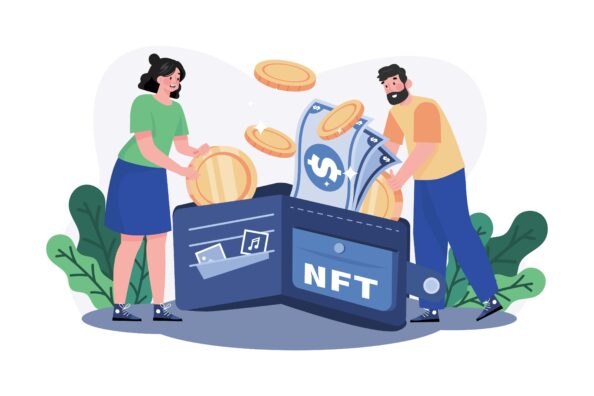
Now that you know the basics of music NFTs, you may be ready to purchase your own tokens. Buying one can be time-consuming and difficult if you don’t know where to start. Here are some steps to follow when purchasing music NFTs.
Step 1: Install and set up a crypto wallet. To install a cryptocurrency wallet, you need to click the download button on the wallet’s official website. You can also find installation instructions or even video tutorials there. This process takes a few minutes.
Step 2: Buy crypto. Once you’ve created the wallet, you’re ready to buy cryptocurrency. You can go to a regulated broker or buy digital currencies through a cryptocurrency exchange. The purchase process is not complicated, just enter the desired amount, and you’ll find the funds in your portfolio.
Step 3: Transfer funds to your wallet. Once you set up your account, you’ll receive a wallet address. It is a string of 64 characters that holds the data related to your wallet on the blockchain. Go back to the crypto trading platform with the wallet address and send funds to your wallet. Send a small amount first to verify that you have the correct information. After verification, transfer the remaining amount.
Step 4: Connect your wallet. The funds have arrived in your wallet, so you need to connect the wallet to NFT LaunchPad. Just visit the NFT LaunchPad website, press the purple button with a wallet icon, click the icon of your wallet, and confirm the connection on the wallet page.
Step 5: Buy music NFTs. Click on the search bar, enter the name of the collection, select an NFT, press the ‘Buy’ button, review the details, and press ‘Pay’. The funds will be taken, and the NFT will appear in your connected wallet.

To create and sell a music NFT, you must first mint it. Minting can be described as the process of mapping a digital file onto a blockchain, where it exists in an immutable form forever.
The platform you use to mint your music file or album art is responsible for the technical aspects of creating the NFT on condition that you provide the correct file type and pay the transaction fee required to mint the file.
Here are some general steps to help you create and sell a music NFT.
Step 1: Select the music file or album art you want to mint. Music NFTs can contain album art, a sound clip, or even both at the same time. If it’s audio, most marketplaces accept MP3, MP4, and WAV file formats. You may also need to compress files larger than 100MB.
Step 2: Submit your NFT details. Add a title, description, genre, and tags. If the platform allows, add a link to your social media.
Step 3: Complete the minting process. To digitize your NFT, you must pay a gas fee. These fees cover the energy required to validate the transaction.
Step 4: Choose a selling method. Now it’s time to list your newly created music NFT on a marketplace. Users can usually list NFTs for a fixed price or set them up for an auction. Some marketplaces also offer private sales.
Remember, your most important decision is choosing the marketplace you want to mint and sell on. Platforms determine your royalty percentage, which is applied to all future sales.
Music NFTs and other Web3 technologies are likely to revolutionize the creative economy for music and change the current industry model. For example, NFTs can transform the way exclusive content is distributed and consumed, cutting out middlemen like record labels and allowing musicians to earn a fair income.
In addition, using NFTs makes artists less dependent on distributors, major labels, and streaming services because creators don’t have to adapt their musical direction to someone else’s needs and give up ownership rights to third parties. Music NFTs also help artists build stronger relationships with their fans. All in all, the use of Web3 technologies will stimulate creativity in the music industry.
Music fans also benefit from using NFTs. They get a direct and transparent way to purchase the works of their favorite musicians.
Several trends help us predict the future of NFT music. Let’s take a look at them.
To sum up, as the adoption of Web3 technology grows, there will be more digital assets. Therefore, we can predict that music NFTs are here to stay.
Music NFTs are a revolutionary concept in the music industry. Uniqueness is one of the most important features of NFTs, which provide verifiable proof of ownership of audio files and music videos. In addition, the applications of music NFTs can include various types of assets involved in sales and production in the music industry. Versatility is another feature of non-fungible tokens that attracts modern creators.
Musicians can reap significant benefits from using NFT music by easily applying copyright and ownership rights. In addition, NFT music brings profits directly to the artists, bypassing the record labels.
Are music NFTs a good investment? Most likely. You’ll need to trust your sixth sense and do your due diligence. You should also assess your risk tolerance and trust and support the community.
If you have any further questions, don’t hesitate to contact our team of experts.